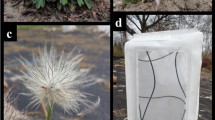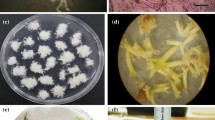Abstract
ONE of the most difficult problems in the culture of plant embryos is to find a satisfactory way of extracting the embryo from the seed without damage and in such a manner that both embryo and culture medium remain sterile. This is particularly difficult if the seed coat is very hard, and usually dissection under sterile conditions is the standard method employed1,2. The following technique was originally evolved to provide an easy method for extraction of mature Pæonia embryos from their seeds, and has since been used in the removal of embryos from other hard-coated seeds.
This is a preview of subscription content, access via your institution
Access options
Subscribe to this journal
Receive 51 print issues and online access
$199.00 per year
only $3.90 per issue
Buy this article
- Purchase on Springer Link
- Instant access to full article PDF
Prices may be subject to local taxes which are calculated during checkout
Similar content being viewed by others
References
Lofland, H. B., Bot. Gaz., 111, 307 (1950).
Rietsema, J., Satina, S., and Blakeslee, A. F., Amer. J. Bot., 40, 538 (1953).
Conard, H. S., Publ. Carneg. Inst., 4 (1905).
Author information
Authors and Affiliations
Rights and permissions
About this article
Cite this article
GWYNNE, M. A Quick Method for Extracting Plant Embyros from Certain Types of Seed. Nature 184, 1588–1589 (1959). https://doi.org/10.1038/1841588b0
Issue Date:
DOI: https://doi.org/10.1038/1841588b0
Comments
By submitting a comment you agree to abide by our Terms and Community Guidelines. If you find something abusive or that does not comply with our terms or guidelines please flag it as inappropriate.



